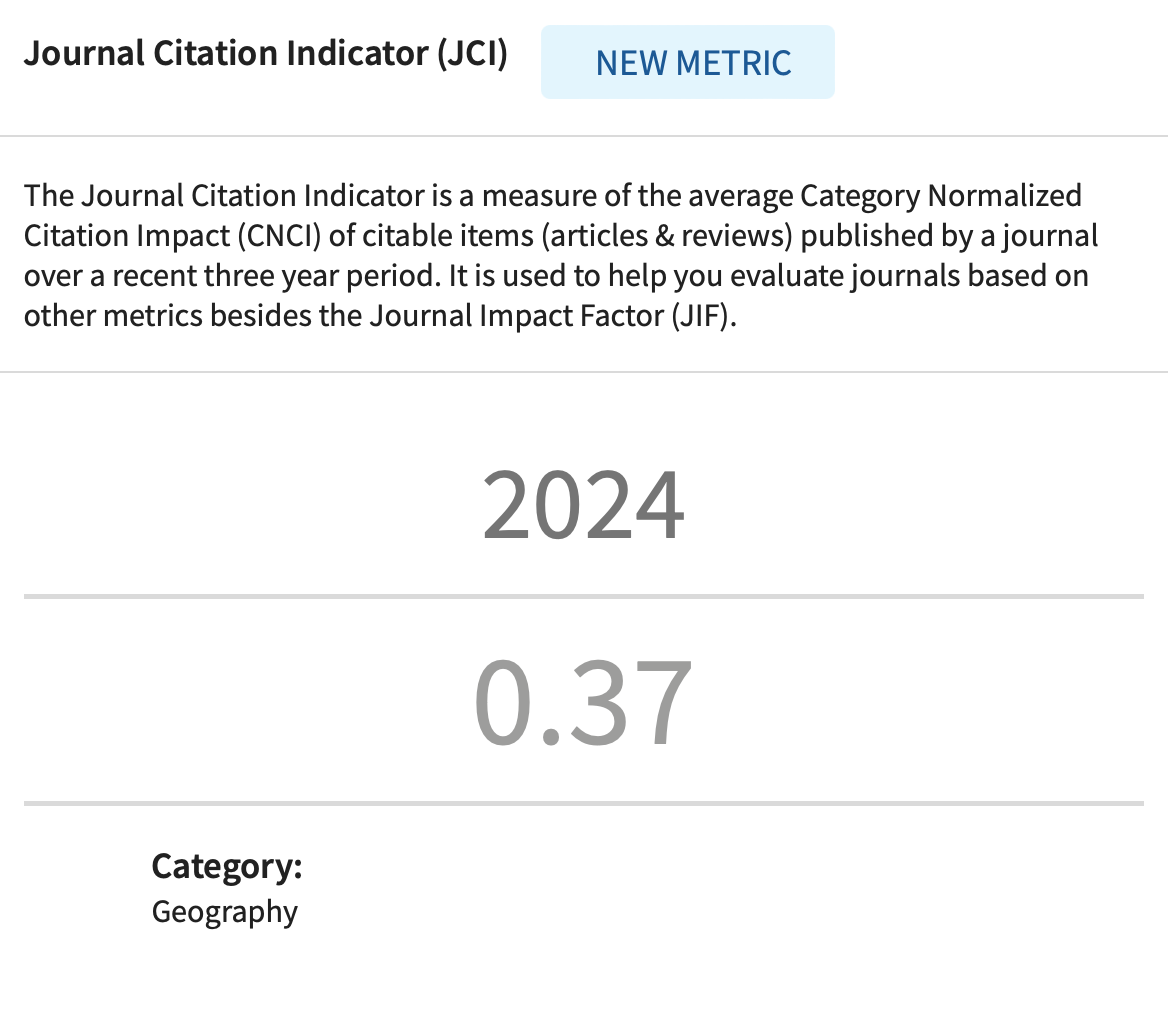SPATIO-TEMPORAL VARIABILITY OF PRECIPITATION OVER THE WESTERN BALKAN COUNTRIES AND ITS LINKS WITH THE ATMOSPHERIC CIRCULATION PATTERNS
DOI:
https://doi.org/10.2298/IJGI2101029MKeywords:
climate change, precipitation, atmospheric circulations, Western BalkanAbstract
Temporal and spatial variability of annual and seasonal precipitation from 71 stations located in Western Balkan (WB) countries (Serbia, Bosnia and Herzegovina, and Montenegro) and their correlations with nine atmospheric circulation patterns was examined for the period 1950–2016. Annual precipitation increased significantly throughout the WB (from 2% to 8% per decade) on 20% of stations located mainly in the mountainous western Serbia and eastern Bosnia and Herzegovina. Winter was characterized by non-significant precipitation changes in most of the studied area, with only a few stations characterized by significant precipitation increase (up to 12% per decade) in the mountainous area of WB, and a few stations characterized by significant decrease (up to –6% per decade) in the Pannonian plain. Significant precipitation increase was noticed on 15% of the stations in spring, while it was noticed on 17% of the stations in autumn. Summer precipitation decreased significantly (up to –5% per decade) on a limited area of northern Serbia (6% of the stations), while the majority of stations showed non-significant increase. The strongest influences on annual precipitation in WB region are of the Arctic Oscillation (AO) and Mediterranean Oscillation (MO), leading to the precipitation decrease during their positive phases. Winter precipitation is significantly negatively correlated with AO, East Atlantic/Western Russia oscillation (EA/WR), and North Atlantic Oscillation (NAO) and has a significant positive correlation with Western Mediterranean Oscillation (WeMO) on the majority of stations. MO has the strongest influence on summer precipitation in WB region leading to precipitation decrease, while AO has the dominant influence on precipitation in the region during autumn.
Article metrics
References
Bojariu, R., & Giorgi, F. (2005). The North Atlantic Oscillation signal in a regional climate simulation for the European region. Tellus A: Dynamic Meteorology and Oceanography, 57(4), 641–653. https://doi.org/10.3402/tellusa.v57i4.14709
Burić, D., Ducić, V., Mihajlović, J., Luković, J., & Dragojlović, J. (2014). Relationship between the precipitation variability in Montenegro and the Mediterranean oscillation. Bulletin of the Serbian Geographical Society, 94(4), 109–120. https://doi.org/10.2298/GSGD1404109B
Central Intelligence Agency. (2021). The World Factbook. Retrieved from https://www.cia.gov/the-world-factbook/countries/
Dabrowski, M., & Myachenkova, Y. (2018). The Western Balkans on the road to the European Union (No. 2018/04). Retrieved from https://www.bruegel.org/wp-content/uploads/2018/02/PC-04_2018.pdf
Davidović, R. (2004). Regionalna geografija Evrope [Regional geography of Europe]. Novi Sad, Serbia: University of Novi Sad.
de Luis, M., Čufar, K., Saz, M. A., Longares, L. A., Ceglar, A., & Kajfež-Bogataj, L. (2012). Trends in seasonal precipitation and temperature in Slovenia during 1951–2007. Regional Environmental Change, 14(5), 1801–1810. https://doi.org/10.1007/s10113-012-0365-7
Dong, Y., Zhai, J., Zhao, Y., Li, H., Wang, Q., Jiang, S., . . . & Ding, Z. (2020). Teleconnection patterns of precipitation in the Three-River Headwaters region, China. Environmental Research Letters, 15(10), 104050. https://doi.org/10.1088/1748-9326/aba8c0
Dubrovský, M., Hayes, M., Duce, P., Trnka, M., Svoboda, M., & Zara, P. (2013). Multi-GCM projections of future drought and climate variability indicators for the Mediterranean region. Regional Environmental Change, 14(5), 1907–1919. https://doi.org/10.1007/s10113-013-0562-z
Efthymiadis, D., Jones, P. D., Briffa, K. R., Böhm, R., & Maugeri, M. (2007). Influence of large-scale atmospheric circulation on climate variability in the Greater Alpine Region of Europe. Journal of Geophysical Research, 112(D12), D12104. https://doi.org/10.1029/2006jd008021
Esri. (2018). ArcGIS [Computer software]. Retrieved from https://www.esri.com/en-us/arcgis/products/arcgis-pro/overview
Fabris, N., & Žugić, R. (2012). Regionalisation and regional policy of Montenegro. Journal of the Geographical Institute “Jovan Cvijić” SASA, 62(1), 49–67. https://doi.org/10.2298/IJGI1201049F
Fernández, J., Sáenz, J., & Zorita, E. (2003). Analysis of wintertime atmospheric moisture transport and its variability over southern Europe in the NCEP Reanalyses. Climate Research, 23(3), 195–215. https://doi.org/10.3354/cr023195
Gautheir, T. D. (2001). Detecting Trends Using Spearman's Rank Correlation Coefficient. Environmental Forensics, 2(4), 359–362. https://doi.org/10.1080/713848278
Hurrell, J. W. (1995). Decadal Trends in the North Atlantic Oscillation: Regional Temperatures and Precipitation. Science, 269(5224), 676–679. https://doi.org/10.1126/science.269.5224.676
Hurrell, J. W., & Van Loon, H. (1997). Decadal variations in climate associated with the North Atlantic Oscillation. Climatic Change, 36(3), 301–326. https://doi.org/10.1023/a:1005314315270
Intergovernmental Panel on Climate Change. (2007). The Physical Science Basis, Summary for Policymakers (contribution of WG I to the 4th Assessment Report of the IPCC). Cambridge, UK: Cambridge University Press.
Intergovernmental Panel on Climate Change. (2018). Summary for Policymakers. In V. Masson-Delmotte, P. Zhai, H.-O. Pörtner, D. Roberts, J. Skea, P. R. Shukla, A. Pirani, W. Moufouma-Okia, C. Péan, R. Pidcock, S. Connors, J. B. R. Matthews, Y. Chen, X. Zhou, M. I. Gomis, E. Lonnoy, T. Maycock, M. Tignor, & T. Waterfield (Eds.), Global Warming of 1.5°C. An IPCC Special Report on the impacts of global warming of 1.5°C above pre-industrial levels and related global greenhouse gas emission pathways, in the context of strengthening the global response to the threat of climate change, sustainable development, and efforts to eradicate poverty (pp. 3–24). Retrieved from https://www.ipcc.ch/site/assets/uploads/sites/2/2019/06/SR15_Full_Report_Low_Res.pdf
Irannezhad, M., Liu, J., & Chen, D. (2020). Influential Climate Teleconnections for Spatiotemporal Precipitation Variability in the Lancang‐Mekong River Basin From 1952 to 2015. Journal of Geophysical Research: Atmospheres, 125(21), e2020JD033331. https://doi.org/10.1029/2020JD033331
Irannezhad, M., Marttila, H., & Kløve, B. (2014). Long‐term variations and trends in precipitation in Finland. International Journal of Climatology, 34(10), 3139–3153. https://doi.org/10.1002/joc.3902
Jakab, G., Bíró, T., Kovács, Z., Papp, Á., Sarawut, N., Szalai, Z., Madarász, B., & Szabó, S. (2019). Spatial analysis of changes and anomalies of intense rainfalls in Hungary. Hungarian Geographical Bulletin, 68(3), 241–253. https://doi.org/10.15201/hungeobull.68.3.3
Jacobeit, J., Hertig, E., Seubert, S., & Lutz, K. (2014). Statistical downscaling for climate change projections in the Mediterranean region: methods and results. Regional Environmental Change, 14(5), 1891–1906. https://doi.org/10.1007/s10113-014-0605-0
Jovanović, G., Reljin, I., & Reljin, B. (2008). The influence of Arctic and North Atlantic Oscillation on precipitation regime in Serbia. IOP Conference Series: Earth and Environmental Science, 4, 012025. https://doi.org/10.1088/1755-1307/4/1/012025
Kertész, Á. (2016). Is desertification a problem in Hungary? Landscape & Environment, 10(3–4), 242–247. https://doi.org/10.21120/LE/10/3-4/18
Luković, J., Bajat, B., Blagojević, D., & Kilibarda, M. (2014). Spatial pattern of recent rainfall trends in Serbia (1961–2009). Regional Environmental Change, 14(5), 1789–1799. https://doi.org/10.1007/s10113-013-0459-x
Martin-Vide, J., & Lopez-Bustins, J.-A. (2006). The Western Mediterranean Oscillation and rainfall in the Iberian Peninsula. International Journal of Climatology, 26(11), 1455–1475. https://doi.org/10.1002/joc.1388
Milošević, D. D., Savić, S. M., Pantelić, M., Stankov, U., Žiberna, I., Dolinaj, D., & Leščešen, I. (2016). Variability of seasonal and annual precipitation in Slovenia and its correlation with large-scale atmospheric circulation. Open Geosciences, 8(1), 593–605. https://doi.org/10.1515/geo-2016-0041
Oliver, M. A., & Webster, R. (1990). Kriging: a method of interpolation for geographical information systems. International Journal of Geographical Information System, 4(3), 313–332. https://doi.org/10.1080/02693799008941549
Pavlović, M. (2018). Geografija Srbije 1 [Geography of Serbia 1]. Belgrade, Serbia: University of Belgrade, Faculty of Geography.
Pavlović Berdon, N. (2012). The Impact of Arctic and North Atlantic Oscillation on Temperature and Precipitation Anomalies in Serbia. Geographica Pannonica, 16(2), 44–55. Retrieved from http://www.dgt.uns.ac.rs/dokumentacija/pannonica/papers/volume16_2_2.pdf
Pavlović Berdon, N. (2013). The Impact of Teleconnection on Pressure, Temperature and Precipitation in Serbia. International Journal of Remote Sensing Applications, 3(4), 185–192. https://doi.org/10.14355/ijrsa.2013.0304.03
Popov, T., Gnjato, S., Bajić, D., & Trbić, G. (2019). Spatial Patterns of Precipitation in Bosnia and Herzegovina. Journal of the Geographical Institute “Jovan Cvijić” SASA, 69(3), 185–195. https://doi.org/10.2298/IJGI1903185P
Popov, T., Gnjato, S., & Trbić, G. (2018). Analysis of extreme precipitation over the Peripannonian region of Bosnia Hercegovina. Időjárás, 122(4), 433–452. https://doi.org/10.28974/idojaras.2018.4.5
Popov, T., Gnjato, S., & Trbić, G. (2019). Changes in precipitation over the East Herzegovina region. Bulletin of the Serbian Geographical Society, 99(1), 29–44. https://doi.org/10.2298/GSGD1901029P
Ríos-Cornejo, D., Penas, Á., Álvarez-Esteban, R., & del Río, S. (2015). Links between teleconnection patterns and precipitation in Spain. Atmospheric Research, 156, 14–28. https://doi.org/10.1016/j.atmosres.2014.12.012
Salmi, T., Määttä, A., Anttila, P., Ruoho-Airola, T., & Anmell, T. (2002). Detecting trends of annual values of atmospheric pollutants by the Mann-Kendall test and Sen's slope estimates-the Excel template application MAKESENS. Helsinki, Finland: Finnish Meteorological Institute.
Szabó, S., Szopos, N. M., Bertalan-Balázs, B., László, E., Milošević, D. D., Conoscenti, C., & Lázár, I. (2019). Geospatial analysis of drought tendencies in the Carpathians as reflected in a 50-year time series. Hungarian Geographical Bulletin, 68(3), 269–282. https://doi.org/10.15201/hungeobull.68.3.5
Sneyers, R. (1991). On the statistical analysis of series of observations (Technical Note No. 143). Retrieved from https://library.wmo.int/index.php?lvl=notice_display&id=7427
Stadtherr, L., Coumou, D., Petoukhov, V., Petri, S., & Rahmstorf, S. (2016). Record Balkan floods of 2014 linked to planetary wave resonance. Science Advances, 2(4), e1501428. https://doi.org/10.1126/sciadv.1501428
Tošić, I. (2004). Spatial and temporal variability of winter and summer precipitation over Serbia and Montenegro. Theoretical and Applied Climatology, 77(1–2), 47–56. https://doi.org/10.1007/s00704-003-0022-7
von Storch, H., & Zwiers, F. W. (1999). Statistical Analysis in Climate Research. Cambridge, UK: Cambridge University Press.
Visbeck, M. H., Hurrell, J. W., Polvani, L., & Cullen, H. M. (2001). The North Atlantic Oscillation: Past, present, and future. Proceedings of the National Academy of Sciences of the United States of America, 98(23), 12876–12877. https://doi.org/10.1073/pnas.231391598
Zikov, M., & Bakeva, V. (2014). Variations in precipitation in Republic of Macedonia. Acta geographica Bosniae et Herzegovinae, 2, 29–34. Retrieved from https://www.geoubih.ba/publications/Acta2/Article-Mihailo%20Zikov,Verica%20Bakeva.pdf
Downloads
Published
How to Cite
Issue
Section
License
Copyright (c) 2021 Journal of the Geographical Institute “Jovan Cvijić” SASA

This work is licensed under a Creative Commons Attribution-NonCommercial-NoDerivatives 4.0 International License.











